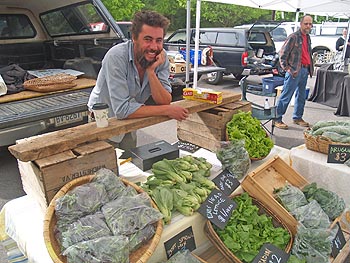Area Consumers Vote With Their Wallets

|
| Area farmer’s markets make it easy to purchase locally grown food. |
Staff Reports
WNC a Regional Leader in Local Food Sales
Seven billion dollars. That’s the figure that local food sales are predicted to reach nationally in 2012, according to a report released last month by the U.S. Department of Agriculture. Appalachian Sustainable Agriculture Project (ASAP) estimates that Western North Carolina consumers alone purchased $62 million worth of local food in 2010, a four-fold increase since the Asheville-based nonprofit’s “Appalachian Grown™” certification and branding program began in 2007. The organization’s recent consumer survey explains the increase: understanding that local food benefits local communities.
“We are way ahead of the rest of the country when it comes to
supporting local farms,” says Charlie Jackson, ASAP’s executive
director. ASAP’s survey, conducted this spring in the greater Asheville
area (Buncombe, Madison, and Henderson counties) and the state’s six
westernmost counties found that a majority (55 percent) of respondents
reported spending over one-tenth of their food budget on locally grown
products. More than 80 percent of respondents say they choose local food
because the purchases help support local farms and contribute to the
local economy.
In addition to farms, businesses benefiting from the increase include
grocery stores and eateries in the region’s vibrant and growing
independent restaurant scene. Seventy-seven percent of survey
respondents deemed local food a somewhat or very important consideration
in choosing a grocery store, and roughly 6 in 10 (64 percent) viewed it
as somewhat or very important when choosing a restaurant. More than
half mentioned Ingles as their grocery store of choice for locally grown
food.
How do those surveyed define “local?” Almost four of five consider food
local if grown in Western North Carolina. Roughly one quarter call it
local if it’s grown in their county, and 19 percent define local as
within 100 miles of their home.
For more information about ASAP’s regional local food sales
calculations and 2011 consumer survey, contact Communications
Coordinator Maggie Cramer at [email protected] or (828)
236-1282 ext. 113.
About Appalachian Sustainable Agriculture Project (ASAP)
ASAP’s mission is to help local farms thrive, link farmers to markets
and supporters, and build healthy communities through connections to
local food. To learn more about ASAP’s work in the region, visit
asapconnections.org , or call (828) 236-1282.








